Payesh / Chaler Payesh / Bengali Rice Kheer
When I think of kheer I think of a sweet semi solid semi
liquid brownish milk which is very creamy and velvety in texture and is
flavoured with cardamom powder. In other words it’s the liquid version of khoya
or evaporated milk. That is what we think of when we think of kheer. To us
kheer is completely made with milk and no other ingredients are added to it
except cardamom powder and sugar.
Whereas Payesh is a complete different story. By “Payesh”
we understand a sweet dish, where some other major ingredient is added to a
little bit thickened milk and then cooked with it. So for “chaler payesh” or “Rice
Kheer” we understand rice being added to the thickened milk and then cooked
along with it.
Although there are some wide varieties of payesh
available all over India, there is only some which are popular in Bengal. One
is this “Chaler Payesh” ~ payesh made with rice. But there are Simaier Payesh,
Sujir Payesh, Chosir Payesh and Sabur Payesh. Chaler Payesh is flavoured with
Jaggery or more specifically wih “Nalen Gur” in the winter and then it is
called “Nalen Gurer Payesh”, but that is completely another story.
We make this Chaler Payesh
almost for every occasion, from small to the grand. Be it the rice eating
ceremony for the new born aka onnoprason, or birthdays or any kind of celebration.
Birthdays are incomplete without the “mayer
hat’er payesh”(kheer made by mother), which is first served to the god as “bhog”.
After that the payesh is served to the birthday girl or boy. In a way Payesh is
the main attraction for the birthdays. It was the main treat for me on that
very day. Ma made sure that on my birthday I wake up and bathe early in the
morning. Then I used to wear a new cloth and go to our house temple / “thakur
ghor” to pray, where Ma had already did her puja. Then in the lunch she used to
serve me a big pot of payesh in a big “pitoler bati” / "shining brass bowl", with holy basil on top of
it, along with a big meal, prepared just for me. The meal consisted of five
kinds of fries, fishes, curries, rice / pulao and sweets. I had to sniff
everything 3 times and throw away before eating a new item. That was a ritual
ma made sure I did in front of her.
Any big or grand meal has to be wrapped up with this
chaler payesh. And similarly no “bhog” is complete without it. So, for this
reason, for a long time I thought payesh means only Rice Kheer. Then as I grew
up I came to know about the other variations. Also for making Payesh try to use
Gobindobhog Rice, which adds in a lot of flavour to the dish. Although fine
Basmati Rice does a decent job for making the payesh, but it’s the Gobindobhog
Rice, which you have to use to have that proper Bengali Style Payesh / Rice
kheer in your home.
Chaler Payesh / Payesh / Bengali Rice Kheer
Serves 4-5
Ingredients:
1.5ltr of whole cow milk
1/3 cup of Gobindobhog Rice (In case of unavailability use
fine Basmati rice)
2 tbsp ghee
2 tsp ghee for sautéing the cashews and raisins
1-2 cups of sugar (adjust according to your taste)
3-4 green cardamoms
2 medium bay leaves
¼ cup of raw unsalted cashews
A handful of raisins – golden / brown
Some saffron threads to garnish
2-3 almonds – slivered to garnish
Some mint leaves to garnish
Method:
Wash the rice until the water runs out clean. After that soak the washed rice in water for
about 30 minutes. After 30 minutes drain the water and keep the soaked rice separately.
In a heavy bottomed saucepan simmer the milk until the
milk comes to a boil. Once the milk starts to boil put the flame on low and
simmer for 10-12 minutes.
During this process of simmering on low flame, stir
continuously so that the milk does not stick to the bottom of the pan.
Take another kadai and heat ghee in it. Once the ghee melts
put the drained rice into the kadai and start stirring so that none of the rice
grains stick to the kadai.
Continue stirring until the rice becomes a little stiff
and does not stick to each other.
At this point put off the flame and transfer the rice to
a bowl.
In the same kadai heat rest of the ghee and sauté the
cashews and raisins in it separately until the cashews become a little golden
and the raisins puff up.
Keep them in a separate bowl.d
Add the fried rice to the milk.
Add the fried rice to the milk.
Put cover and let the rice cook.
It will take about 30-45 minutes for the rice to get
cooked properly. Do check by crushing some of the rice grains.
Add the sautéed cashews and raisins to the milk when the
rice is almost cooked.
If the milk dries out too much then add some more milk to
the cooking payesh. It’s necessary to keep it liquid because the payesh tends
to thicken when it cools down to room temperature.
However if you like thick payesh do ignore this step.
Once the rice is cooked nicely, add the sugar to the milk.
The payesh will immediately become a little fluid.
Taste and adjust the sugar level.
The payesh will immediately become a little fluid.
Taste and adjust the sugar level.
Now addthe crushed green cardamom and the bay leaf.
Simmer on low to get the previous consistency of the payesh. Then switch off the flame and keep the payesh aside to let it come to room temperature.
Simmer on low to get the previous consistency of the payesh. Then switch off the flame and keep the payesh aside to let it come to room temperature.
Serve with some slivered almonds, saffron threads and mint
leaves on top.
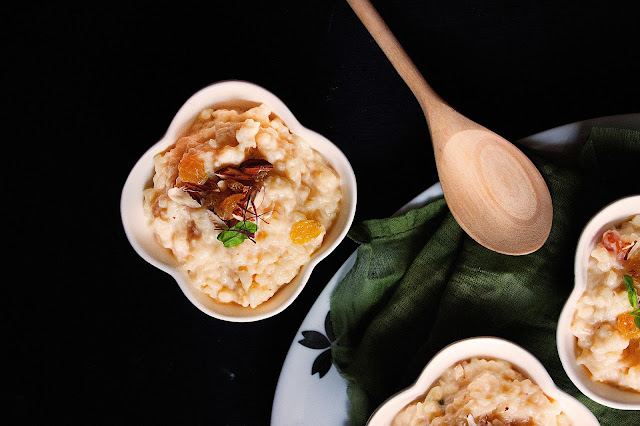
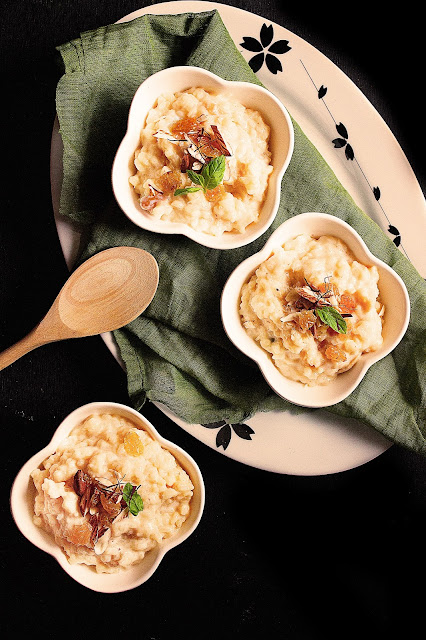

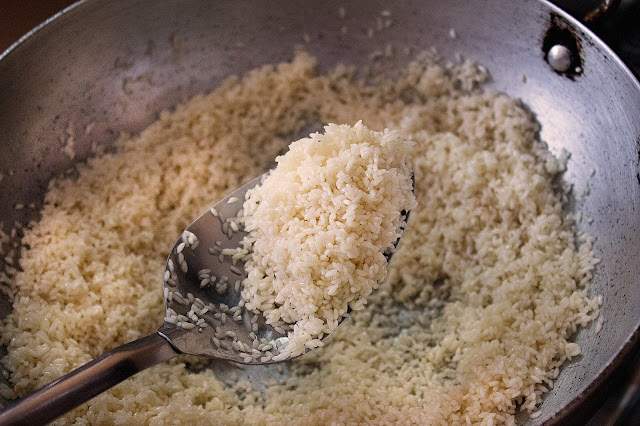

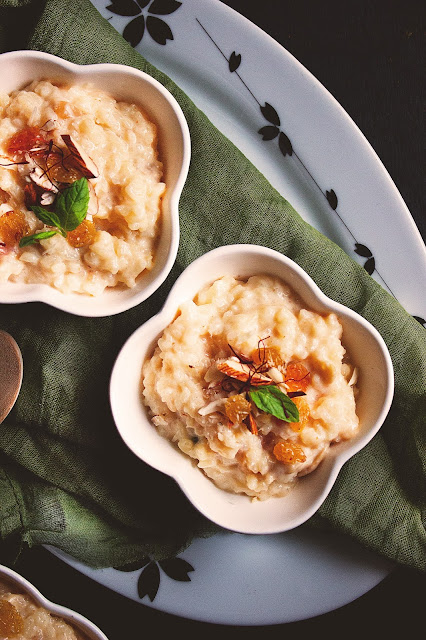






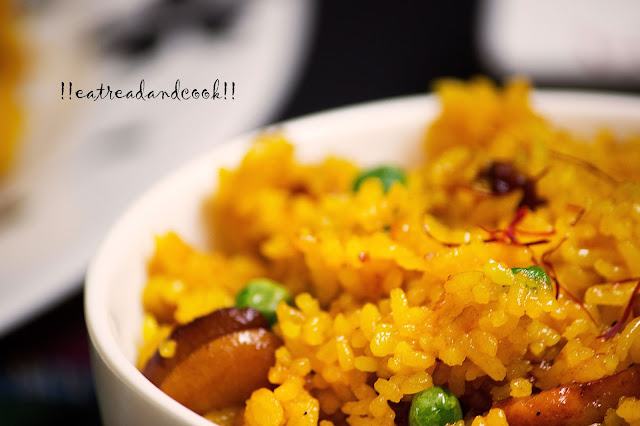

Comments
Post a Comment